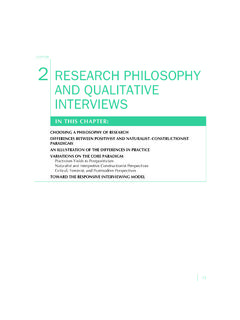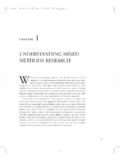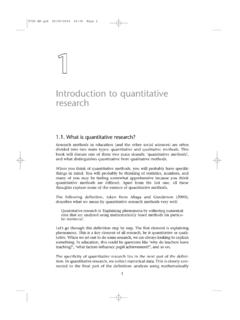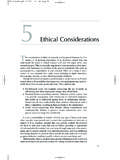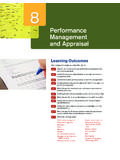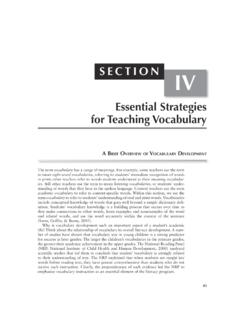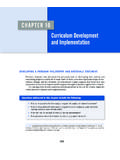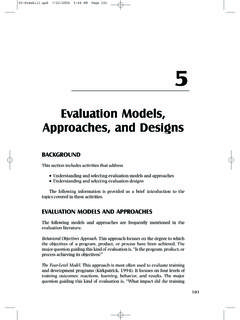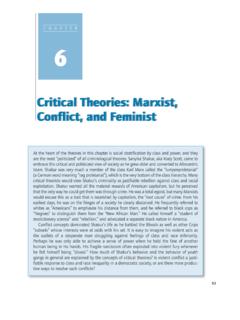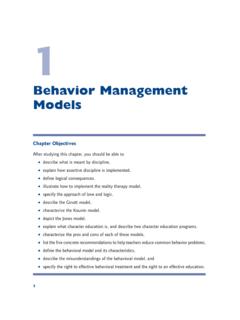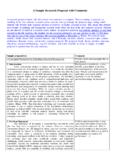Transcription of Literature Review and Focusing the Research
1 389 Literature Review and Focusing the ResearchWhen asked, Why do a Literature Review ?, a somewhat cynical answer may have popped into some of your minds: Why do a Literature Review ? It is required for my Research class, or I have to do a thesis or dissertation. Then, again, some of you may have more socially redeeming motivations, such as wanting to change the world or improve your practice of a profession. Literature reviews are important as Research tools, especially in emerging areas, with populations that typically yield small samples ( , special education Research often does), or in areas that represent value-laden positions adopted by advocacy groups.
2 Literature reviews are also valuable in light of the knowledge explosion and the consequent impossibility of reading everything. Therefore, it is good that someone does Literature few definitions will make your progress through this chapter more enjoyable:Preliminary sources: Databases that contain information about Research articles that are published on the topic of interest to sources: Literature reviews that are published on your topic of interest consisting of a synthesis and analysis of previous Research published on that empirical Research : Reports of studies that are conducted by the researcher(s) that include a description of the methods, sampling and data collection strategies, and data analysis and and evaluation in education and PsychologyReasons for Doing Literature ReviewsThere are two major reasons for conducting a Literature Review : to conduct primary Research oneself (or as a part of a team) or as an end in Reviews for Planning Primary ResearchAlmost every primary Research study begins with a Review of the Literature .
3 The purpose of the Literature Review section of a Research article is to provide the reader with an overall framework for where this piece of work fits in the big picture of what is known about a topic from previous Research . Thus, the Literature Review serves to explain the topic of the Research and to build a rationale for the problem that is studied and the need for additional Research . Boote and Beile (2005) eloquently explain the purpose of a Literature Review in planning primary Research :As the foundation of any Research project , the Literature Review should accomplish several important objectives. It sets the broad context of the study, clearly demarcates what is and what is not within the scope of the investigation, and justifies those decisions.
4 It also situates an existing Literature in a broader scholarly and historical context. It should not only report the claims made in the existing Literature but also examine critically the Research methods used to better understand whether the claims are warranted. Such an examination of the Literature enables the author to distinguish what has been learned and accomplished in the area of study and what still needs to be learned and accomplished. Moreover, this type of Review allows the author not only to summarize the existing Literature but also to synthesize it in a way that permits a new perspective. Thus a good Literature Review is the basis of both theoretical and methodological sophistication, thereby improving the quality and usefulness of subsequent Research .
5 (p. 4)Researchers use the Literature Review to identify a rationale for the need for their own study. Some of the specific rationales for your Research that might emerge from your Literature Review include the following:1. You may find a lack of consistency in reported results across the studies you have chosen to Review and undertake Research to explore the basis of the inconsistency. For example, Berliner et al. (2008) noted inconsistencies in Research on high school dropouts; they suggested that the problem might be that researchers were not differentiating between high school dropouts who reenrolled and those who did You may have uncovered a flaw in previous Research based on its design, data collection instruments, sampling, or interpretation.
6 For example, Borman et al. (2007) reviewed Research on the Success for All literacy program and found that no randomized control studies had been conducted on its effectiveness. The quasi-experimental designs from past Research left the findings open to possible criticism based on uncontrolled extraneous Research may have been conducted on a different population than the one in which you are interested, thus justifying your work with the different population. For example, Schirmer and McGough (2005) reviewed Research Literature on reading development and reading instruction and found that there was a lack of Research of this type on students who are deaf.
7 Therefore, they proposed a need for Research on reading instruction that 91literature Review and Focusing the Researchhas been found to be effective with hearing students to be conducted with deaf students. Another justification for the conduct of Research with deaf students when the previous Research is based on hearing children might be to devise a very different innovative method of reading instruction that is based on sign language and deaf culture. 4. You may document an ongoing educational or psychological problem and propose studying the effect of an innovative intervention to try to correct that problem.
8 For example, Burnard (2008) wanted to explore innovative pedagogical practices to engage students who were facing challenges stemming from poverty, class, race, religion, linguistic and cultural heritage, or gender. In particular, she was interested in how music teachers engaged students who were Uncertainty about the interpretation of previous studies findings may justify further Research . For example, prior Research with people with schizophrenia indicated that participants sometimes continued to feel bewildered about their condition and treatment, even after meeting with a health care professional.
9 Schneider et al. (2004) undertook a study from the perspective of people with mental illness to determine what contributed to their perceptions of effective and ineffective relations with mentioned previously, a Literature Review can be used at the beginning of the study to explain what is known about your topic and provide a rationale for the study you are planning. In addition, the Literature Review can be used to help in the design of the study by providing guidance as to appropriate sample size or identifying promising data collection practices or instruments that can be used in your study. Familiarity with the Literature is useful for both quantitative and qualitative studies no matter what the researcher s paradigm.
10 Everyone who prepares a Literature Review should do so with a critical eye: What are the strengths and weaknesses of the prior Research ? What is missing from the formal body of scholarly Literature that might be necessary in order to formulate an appropriate Research focus and method of investigation?When your purpose is to plan your own Research study, the number of studies that you actually cite in your Literature Review may be fairly limited because of space limitations (for authors who publish in journals) or because the Review is considered a learning activity (in your own course work). Typically, primary Research articles published in journals contain 20 to 30 references to primary Research .
